The installation of a commercial boiler typically takes a few days to several weeks. This timeframe hinges on factors such as the boiler type, site conditions, and the complexity of utility connections. Your installation process involves evaluating heating requirements, preparing the site, and connecting utilities. Furthermore, you'll need to navigate permits and regulations, which can affect timing. Understanding these steps helps in planning effectively and managing expectations. There's more to take into account for a smooth installation process.
Key insights
- Installation time varies based on the complexity of the boiler system and any necessary modifications to existing infrastructure.
- A thorough pre-installation assessment can help anticipate potential delays and streamline the process.
- The technician's expertise and efficiency play a crucial role in determining the overall installation duration.
- Availability of materials and equipment can impact how quickly the installation can be completed.
- On average, installation may take several days to weeks, depending on the specific requirements and site conditions.
Factors Influencing Installation Time
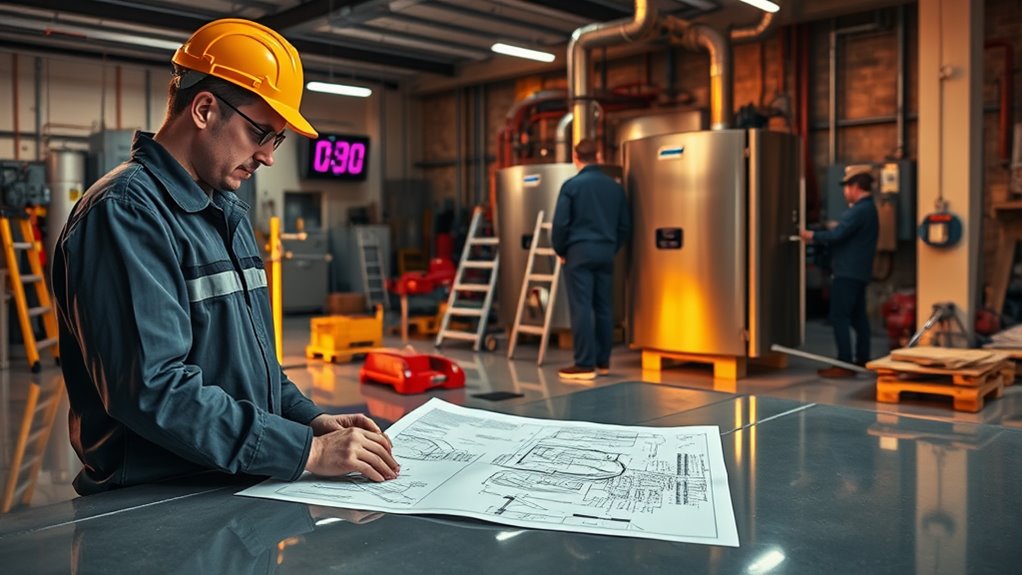
When it comes to installing a commercial boiler, several factors can greatly influence the overall time required for the project. The installation complexity plays an essential role; intricate designs or specific site requirements often necessitate additional planning and labor. If the existing infrastructure needs modification, that'll extend the timeline as well. Your technician's expertise also notably impacts efficiency. A seasoned professional can navigate challenges swiftly, reducing delays and guaranteeing compliance with safety regulations. Additionally, the availability of necessary materials and equipment can either expedite or hinder the process. By understanding these factors, you can better anticipate installation duration and guarantee a smoother shift to your new boiler system. Regular commercial boiler service ensures that your boiler operates efficiently post-installation, preventing future delays caused by unexpected issues.
Types of Commercial Boilers
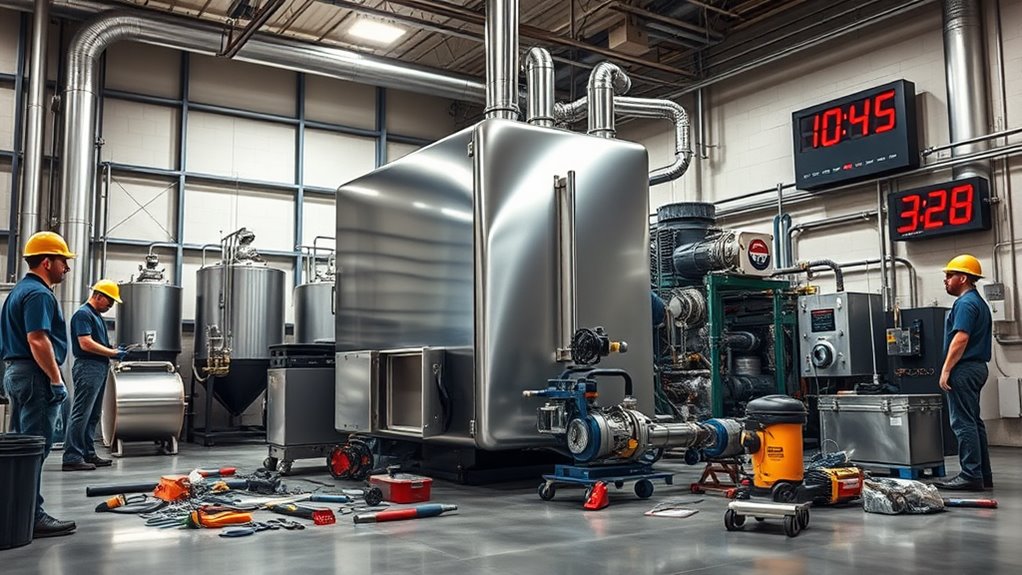
When selecting a commercial boiler, you'll encounter two primary types: fire-tube and water-tube boilers. Fire-tube boilers feature hot gases passing through tubes surrounded by water, while water-tube boilers have water circulating inside tubes heated by external combustion gases. Understanding these distinctions is essential for determining the right boiler for your building's heating needs. Additionally, advanced technology in modern boilers can lead to improved energy efficiency and reduced operational costs.
Fire-Tube Boilers
Fire-tube boilers are one of the most common types of commercial boilers, known for their efficiency and reliability. In these systems, hot gases pass through tubes submerged in water, transferring heat effectively. This design offers excellent fire tube efficiency, making them ideal for a range of applications, such as heating large buildings, industrial processes, and even district heating systems. You'll find fire-tube boilers particularly advantageous in operations requiring quick response times and consistent steam production. Their straightforward design simplifies maintenance, allowing for easier inspections and repairs. When considering a boiler system, the fire-tube options provide an effective solution, ensuring you meet both efficiency and reliability standards in your commercial heating needs. Additionally, investing in energy-efficient heating systems can significantly reduce your operational costs and carbon footprint.
Water-Tube Boilers
Water-tube boilers represent another efficient option in the commercial boiler landscape, particularly suited for high-pressure applications. These systems utilize water-filled tubes, allowing for rapid steam generation and enhanced heat transfer.
Here are some notable water tube advantages:
- High Efficiency: Water-tube boilers typically offer better thermal efficiency compared to fire-tube designs.
- Rapid Response: These boilers can quickly adjust to changing load demands, ensuring consistent performance.
- Space-Saving Design: Their compact design makes them suitable for installations with limited space.
- Robust Construction: Designed for high pressures, they often have longer service lifespans.
- Additionally, water-tube boilers can be integrated with energy-efficient heating solutions, enhancing overall system performance and reducing operational costs.
Pre-Installation Assessment
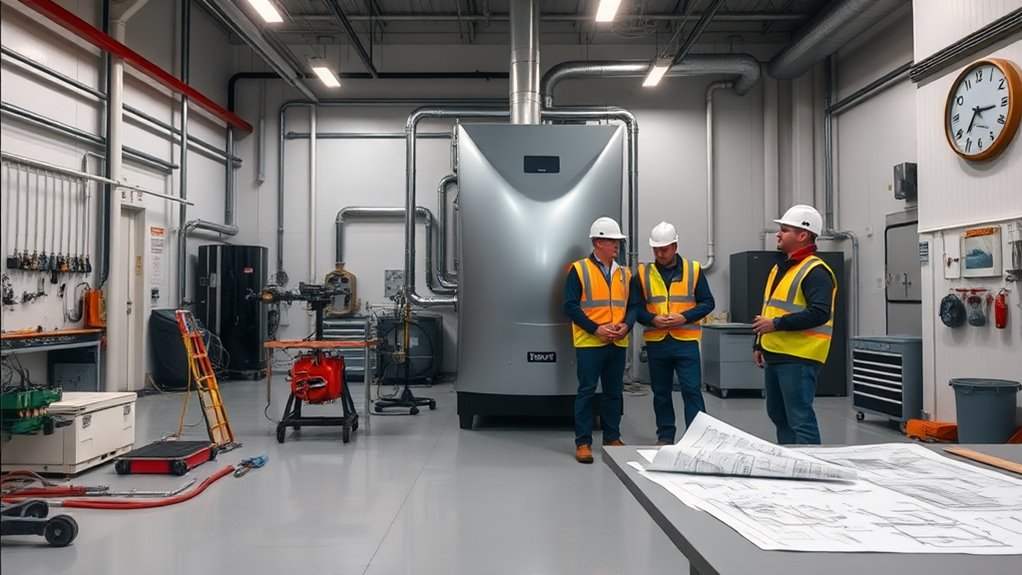
Before diving into the installation process, it's crucial to conduct a thorough pre-installation assessment of your commercial boiler needs. Start by reviewing your pre-installation checklist, which should include evaluating your facility's heating requirements, existing infrastructure, and potential space constraints. Use specific assessment criteria, such as BTU output, efficiency ratings, and fuel type compatibility, to verify you're selecting the right boiler. Analyze the current system's performance, identifying areas where upgrades or modifications are necessary. Engage with your team to gather insights on operational demands. Finally, establish a timeline for installation, accounting for any potential disruptions to your business operations. This meticulous approach lays a solid foundation for a successful boiler installation, minimizing future complications. Additionally, ensure compliance with Commercial Gas Safety Certificate regulations to safeguard your business and ensure the safety of your gas appliances.
Permits and Regulations
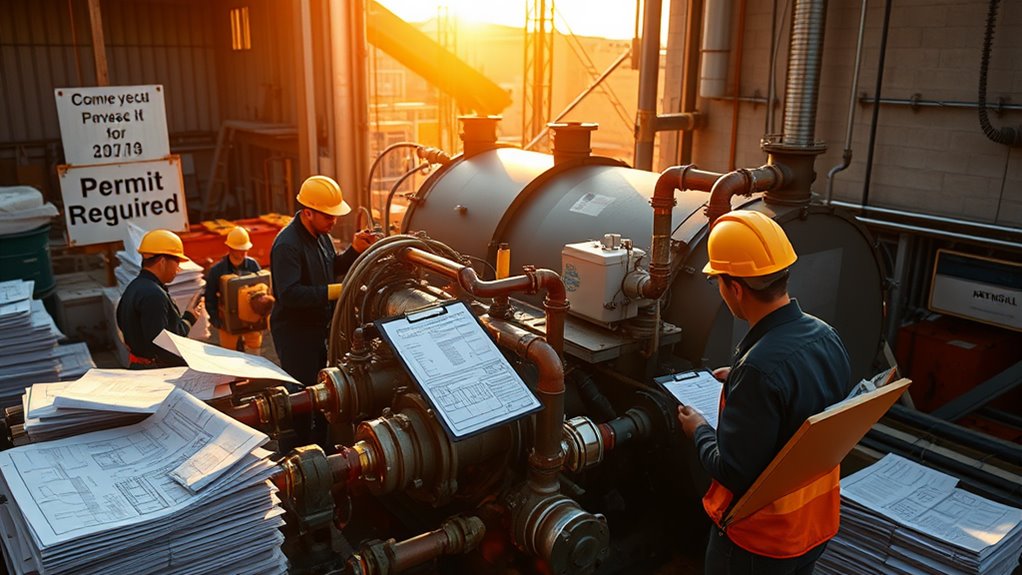
Once you've assessed your commercial boiler needs, the next step involves understanding the permits and regulations that govern boiler installations. Ensuring regulatory compliance is essential to avoid fines and delays. You'll need to navigate various permit applications, which may vary by location and type of boiler. Here are key points to keep in mind:
- Local Building Codes: Check with your city or county for specific requirements.
- Environmental Regulations: Be aware of emissions standards that may apply.
- Safety Standards: Adhere to guidelines set by agencies such as ASME or NFPA.
- Inspection Requirements: Schedule necessary inspections to validate compliance. Regular inspections ensure safe operation of your boiler and compliance with safety regulations.
Site Preparation
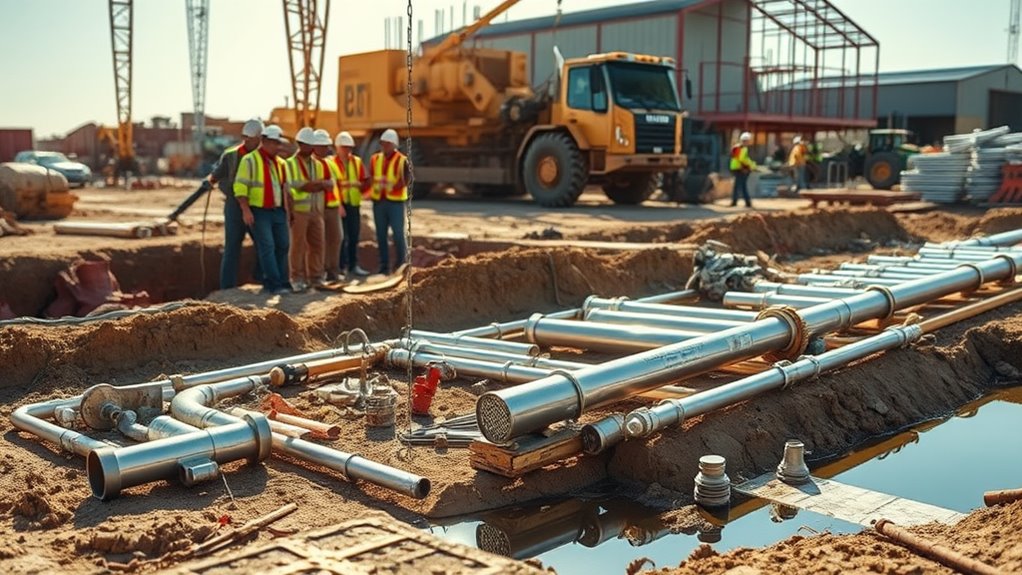
Before installation, you'll need to conduct a thorough site assessment to guarantee the area meets all operational requirements. Consider the space and accessibility for both the boiler and maintenance activities, as well as the setup for necessary utility connections like gas, water, and electricity. Proper site preparation is essential to avoid delays and guarantee safe operation after installation. Additionally, ensuring the site is ready for efficient heating systems can help prevent future performance issues.
Site Assessment Requirements
When planning for the installation of a commercial boiler, conducting a thorough site assessment is essential. This process involves evaluating the site layout and performing safety assessments to guarantee compliance with regulations and operational efficiency. Here are key elements to evaluate:
- Access points: Identify how equipment will be delivered and installed.
- Utilities: Confirm availability of necessary gas, electric, and water connections.
- Ventilation: Assess requirements for proper airflow and exhaust.
- Clearances: Verify distances between the boiler and surrounding structures to meet safety regulations. Additionally, ensure that the site has adequate pressure to support the boiler's operational requirements, as this can impact efficiency and safety during installation.
Space and Accessibility
Space and accessibility are crucial factors in preparing for the installation of a commercial boiler. You need to evaluate the area where the boiler will be located, confirming it complies with local codes and regulations. Space constraints can greatly impact your installation timeline; inadequate room for maneuvering may delay the process. Identify potential accessibility challenges, such as narrow doorways or tight corners, that could hinder equipment delivery and positioning. Consider the necessary clearances around the boiler for maintenance and airflow. A well-planned layout not only streamlines installation but also enhances long-term operational efficiency. By addressing these factors upfront, you can minimize disruptions and facilitate a smoother installation process. Additionally, ensuring proper clearances around the boiler is essential for efficient operation and maintenance access.
Utility Connections Setup
With the area prepared for your commercial boiler, the next step involves setting up utility connections. This process is vital, as it guarantees your system meets the necessary utility requirements. It's important to identify the appropriate connection types based on your boiler's specifications.
Here are some key considerations:
- Gas Lines: Confirm proper sizing and pressure ratings for efficient operation.
- Water Supply: Check flow rate and temperature requirements for peak performance.
- Electrical Connections: Verify voltage and amperage needs to prevent electrical issues.
- Drainage: Establish a reliable drainage system to manage condensation and waste. Additionally, ensure that the pressure gauge is monitored to prevent issues such as low water pressure that can affect boiler functionality.
Installation Process Overview
Although the installation of a commercial boiler can seem intimidating, understanding the process can simplify the task considerably. First, you'll need to create a detailed installation checklist, which includes site preparation, equipment delivery, and safety measures. Next, establish an installation timeline, breaking down each phase, from mounting the boiler to connecting it to existing systems.
During installation, guarantee proper ventilation and support structures are in place. You'll also need to connect the boiler to gas, water, and electrical lines while adhering to local regulations. Finally, engage qualified technicians to oversee the process, guaranteeing compliance and safety throughout. By following these steps and maintaining your checklist, you can streamline the installation and minimize potential delays.
Testing and Commissioning
Testing and commissioning are critical steps in guaranteeing your commercial boiler operates efficiently and safely. During this phase, you'll want to adhere to established testing protocols and utilize detailed commissioning checklists. Here's what you should focus on:
- Verify system pressure and temperature settings.
- Check for proper fuel supply and combustion efficiency.
- Assess electrical connections and control systems.
- Conduct safety tests to guarantee compliance with regulations.
Following these steps not only confirms the boiler's functionality but also enhances longevity and performance. Make certain to document your findings thoroughly and address any issues immediately. This meticulous approach will help you avoid potential problems down the line and guarantee your boiler meets all operational standards.
Common Challenges During Installation
When installing a commercial boiler, you'll often face site preparation issues that can delay progress. Equipment accessibility problems may also arise, complicating the installation process. Additionally, maneuvering regulatory compliance hurdles is essential to guarantee your project meets all legal requirements.
Site Preparation Issues
Before the installation of a commercial boiler can begin, you must address several site preparation issues that commonly arise. These challenges can greatly impact the installation timeline and overall efficiency. Key considerations include:
- Site layout: Verify the area is free of obstructions and allows for proper boiler placement.
- Foundation requirements: Confirm that the ground can support the weight and dimensions of the boiler.
- Drainage: Check for adequate drainage to prevent water accumulation around the unit.
- Access to utilities: Ensure that gas, water, and electrical connections are readily accessible.
Equipment Accessibility Problems
While addressing equipment accessibility is vital for the smooth installation of a commercial boiler, various challenges can arise that hinder the process. You'll often encounter access constraints due to an inadequate equipment layout, which can make maneuvering heavy machinery difficult. Narrow hallways, low ceilings, and tight corners can obstruct the delivery and positioning of the boiler. If the installation area isn't designed with proper accessibility in mind, it can lead to delays and increased labor costs. It's important to assess the site beforehand and guarantee that the layout accommodates the required equipment. By identifying potential access constraints early, you can implement solutions that streamline the installation process and minimize disruptions.
Regulatory Compliance Hurdles
Steering through regulatory compliance hurdles can be one of the most challenging aspects of installing a commercial boiler, especially since local, state, and federal regulations often vary considerably. To navigate these complexities effectively, you'll need to focus on several key areas:
- Understand local codes: Familiarize yourself with specific municipal regulations.
- Prepare compliance documentation: Gather all necessary paperwork for regulatory inspections.
- Schedule inspections: Coordinate with local authorities to guarantee timely inspections.
- Stay updated: Keep abreast of any changes in regulations that may affect your installation.
Balancing these tasks can greatly influence your installation timeline, so allocate ample time to address regulatory compliance to avoid costly delays.
Timeline for Different Boiler Sizes
When selecting a commercial boiler, understanding the installation timeline based on size is essential for project planning. The boiler size considerably impacts the installation duration. Smaller boilers, typically under 300,000 BTU, can be installed in one to three days due to their straightforward setup and fewer connections. Medium-sized boilers, ranging from 300,000 to 1,000,000 BTU, usually take three to five days, as they require more complex piping and connections. Larger boilers, exceeding 1,000,000 BTU, may take a week or more for installation, given their intricate assembly and the need for specialized equipment. By recognizing these installation duration variations, you can better allocate resources and time for a smooth and efficient boiler installation process.
Maintenance Considerations Post-Installation
Once your commercial boiler is installed, it is crucial to implement a robust maintenance plan to guarantee peak performance and longevity. Regular maintenance directly impacts boiler efficiency and helps prevent costly downtime. Here are some key considerations for your maintenance schedules:
- Regular Inspections: Schedule routine checks to identify wear and tear early.
- Cleaning: Keep components free from debris and buildup to maintain efficiency.
- Fluid Levels: Regularly check and adjust water and fuel levels to promote optimal operation.
- Safety Checks: Verify that safety devices and controls are functioning properly to prevent hazards.
Frequently Asked Questions
What Qualifications Should the Installation Team Possess?
When hiring an installation team, you should confirm they have relevant installation experience and hold necessary safety certifications. Look for technicians who are certified by recognized organizations, as this indicates they've undergone proper training and adhere to safety standards. Verify their background in commercial boiler installations specifically, as this expertise is essential for efficient and safe setup. A qualified team will mitigate risks and guarantee compliance with local regulations throughout the installation process.
Can Installation Occur During Peak Business Hours?
Yes, installation can occur during peak business hours, but it comes with installation challenges and potential operational disruptions. You'll need to assess your workflow and customer traffic to minimize interruptions. Communicating with your team and the installation crew is vital to plan effectively. Consider scheduling tasks that require more significant downtime during off-peak hours to guarantee a smooth process while maintaining essential business operations. Prioritize safety and efficiency throughout the installation.
What Is the Typical Cost Range for Installation?
When considering the typical cost range for installation, it's essential to factor in various elements that influence the overall installation timeline. Costs can vary widely, generally ranging from $5,000 to $30,000, depending on boiler type, complexity of the installation, and local labor rates. Additional cost factors include permits, materials, and any necessary upgrades to existing systems. By evaluating these aspects, you can better understand the financial commitment involved in the installation process.
Are There Warranties Available for Installed Boilers?
Yes, there are boiler warranties available for installed boilers. Typically, these warranties cover defects in materials and workmanship for a specified period, often ranging from one to ten years. It's essential to review the warranty coverage details, as some components may have different terms. Always keep your installation records, as proper maintenance is usually required to uphold warranty validity. Discussing options with your installer can help you select the best warranty for your needs.
How Often Should the Boiler Be Serviced Post-Installation?
You should schedule boiler maintenance at least once a year to guarantee peak performance and longevity. However, depending on your boiler's usage and environment, you might need to increase the service frequency. For high-demand systems, biannual inspections are recommended. Regular servicing helps detect potential issues early, maintain efficiency, and adhere to warranty requirements. Following these guidelines will minimize unexpected breakdowns, assuring your boiler operates smoothly throughout its lifespan.
Summary
In summary, the time it takes to install a commercial boiler varies based on several factors, including boiler type and site conditions. By conducting thorough pre-installation assessments and addressing permits and regulations, you can streamline the process. Anticipating common challenges and planning for different boiler sizes will further enhance efficiency. Remember, proper maintenance post-installation is essential for peak performance and longevity. Overall, careful preparation guarantees a successful and timely boiler installation.

